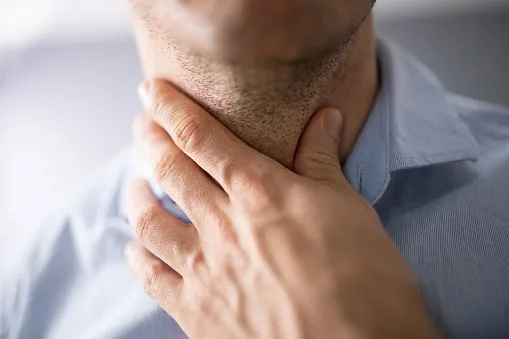We often think that thyroid problems are largely related to women, but men suffer from thyroid imbalances too. In fact, 6 out of 10 men have low libido due to underactive thyroid (and a tendency to gain weight).
Thyroid Health in Men
WHAT IS A THYROID GLAND?
The thyroid is shaped like a bow tie and is similarly located. Its function is to make the thyroid hormones T3 (triiodothyronine) and T4 (thyroxine) and pump them into your bloodstream to be distributed to all organs in your body.
When working properly, these hormones ensure that your metabolism, weight, and mood, among many other body systems, are working well. You could think of the thyroid gland as your body’s energy company. When it is underperforming, everything starts to slow down. When the thyroid is not active enough, it is known as hypothyroidism.
This is when the thyroid gland doesn’t produce enough hormones to support the optimal functioning of the different systems in your body and can result in many different symptoms.
Symptoms of hypothyroidism specifically in men
Sexual dysfunction
Some studies report that about 60% of men with hypothyroidism have low libido (sexual desire), erectile dysfunction, or delayed ejaculation. Hypothyroidism has also been shown to affect semen quality and is associated with lower sperm count, form, and movement.
These factors could potentially lower fertility. While these symptoms may be alarming, they are often reversible with treatment.
Low testosterone
Testosterone is a sex hormone with many important roles in men’s health, including bone and muscle growth, sex drive, and normal reproduction. Hypothyroidism can lower the levels of free testosterone in the blood.
Additionally, hypothyroidism has been associated with lower levels of sex hormone-binding globulin, a protein that carries testosterone throughout the body. Both of these changes can contribute to symptoms of low testosterone in men.

Thinkstock/Getty Images
Treating hypothyroidism can improve testosterone levels, so men with low testosterone may want to have their thyroid levels checked.
How common is hypothyroidism in men?
Hypothyroidism can affect up to 5% of people, although many more may have it without realizing it. Studies show that between 3% to 16% of men can get hypothyroidism, and the risk goes up as you get older.
Women are 5 to 10 times more likely to have hypothyroidism than men. This is because the main cause of hypothyroidism is an autoimmune disease, and these are more common in women.
Common symptoms could include:
- Weight gain
- Tired and run down
- Constipated
- Hair loss
- Brain fog / slow movements and thoughts
- Feeling cold
- Dry skin
- Swelling in the neck
- Low mood/depression
- Muscle aches/cramps/weakness
- Dry skin, brittle nails, and hair
- Numbness or tingling in the hands
THE GOOD NEWS is that many of the unpleasant symptoms are reversible by adopting proactive lifestyle changes for thyroid health and, if necessary, treatment options.
WHAT YOU CAN DO:
Do a self-exam
Stand in front of your mirror and look out for an enlarged thyroid gland. Move your head back, take a sip of water, and as you swallow, examine your neck below the Adam’s apple and above the collarbone. Look for lumps, then repeat the process a few times. If you see a lump, then you need to visit your GP as soon as possible.
Get tested
If you think you have symptoms of a thyroid problem, it is best to ask your GP if you should be tested.
 6 Lifestyle tips to support thyroid health and weight loss
6 Lifestyle tips to support thyroid health and weight loss
1. Cut out simple carbs and sugars
- Focus on complex carbohydrates like starchy vegetables and legumes.
- Avoid simple sugars like sweets and fizzy drinks.
- Food refined grain products and sugary drinks have a high glycaemic load and may increase inflammation in the body.
- Eat enough calories. If you don’t, it can cause a stress response and result in less production of T3 (triiodothyronine – the active thyroid hormone) production.
2. Eat more anti-inflammatory foods
- Anti-inflammatory foods can help ease joint aches and pains as well as depression. All of these can result from an under active thyroid.
- Anti-inflammatory foods can help support the immune system, which is often in overdrive in people with hypothyroidism.
- Anti-inflammatory foods support the intake of essential nutrients needed for healthy thyroid function. These include magnesium, B vitamins, zinc, selenium, iron, and vitamin C.

Photo by Mikhail Nilov from Pexels
- Eating more leafy green vegetables, tomatoes, fatty fish, nuts, fruit, and olive oil – helps with inflammation. Less burden on the liver.
- Healthy liver functions is vital, as it is responsible for converting 60 percent of T4 [the thyroid hormone thyroxine] to T3.
3. Stick to small, frequent meals
- A sluggish thyroid means slower digestion, so eating smaller balanced meals, more frequently, is advisable. This will help support balanced blood sugar levels and decrease cravings.
- A diet high in healthy fats, moderate proteins, and moderate to low carbohydrates is best for thyroid function
4. Keep a food diary
- Logging your daily food intake will help you keep track of how much food you consume, and it will help make sure that you are eating a balanced diet.
5. Move your body
- Exercise is important to build into your lifestyle. It will help burn calories and keep your weight and health in check.
6. Take the right supplements
Herbs that promote thyroid health:
- Fucus vesiculosis (Bladderwrack) and Withania somnifera (Winter Cherry / Ashwagandha), help balance thyroid hormone production for thyroid health.
Trace minerals that promote thyroid health:
- Iodine and selenium promote normal thyroid hormone production, enabling your thyroid to increase your metabolism to help you lose weight.



 6 Lifestyle tips to support thyroid health and weight loss
6 Lifestyle tips to support thyroid health and weight loss
![women [longevity live]](https://longevitylive.com/wp-content/uploads/2020/01/photo-of-women-walking-down-the-street-1116984-100x100.jpg)










